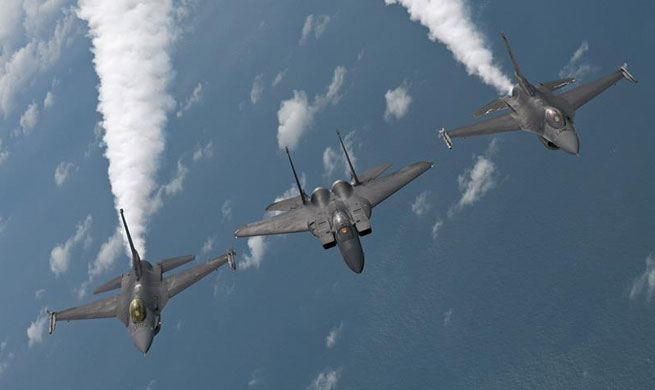by Xinhua writers Mahmoud Darwesh and Nawas Darraji
TRIPOLI, Jan. 16 (Xinhua) -- As the motives behind the recent attack on Tripoli airport in Libya were heatedly discussed, relations to terrorist groups and their arrangements and coordination came into the spotlight, analysts have pointed out.
The Tripoli airport witnessed fierce clashes on Monday which killed 21 people and injured dozens. The clashes happened between the Special Deterrent Force in charge of airport security and an armed militia based in the suburbs of Tripoli and led by a man named Bashir Khalafallah, also know as Baqara.
According to the government backed by the United Nations and the Special Deterrence Force, the motive of the attack was to free terrorist prisoners inside the Reform and Rehabilitation Foundation, or M'etiga prison, which is located inside the Tripoli airbase.
"The official statement by the Government about the motives of attack being to free terrorists is a logical explanation of the incident. However, there are other links revealed by the attack, mainly the link and coordination between terrorist groups despite their weakness and decreased influence," Mohamed Khoja, a Libyan analyst on terrorist groups, told Xinhua.
"When the militia led by Baqara attacked M'etiga airport, it was not a coincidence or an absurdity. It came in accordance with certain arrangements and alliances between terrorist and Islamist groups allied with it, especially in the east of the country, and particularly in Derna." Khoja explained.
"The fighting in the area caused great damage to a number of houses nearby, and panic and fear among women and children," said Khaled Abdul-Rahman, a resident of the area near the airport.
"When I was about to leave my house at 7:30 a.m., I was surprised to see gunmen entering the neighborhood near the airport, carrying light and medium weapons and chanting 'we will free our brothers from the airport prison.' After that, I rushed to the house and left my car open for fear of being shot," Abdul-Rahman told Xinhua.
"A few minutes later, sounds of guns, tanks and weapons were heard from every direction," Abdul-Rahman added.
"A few hours after the attack, the terrorist Shura Council of Mujahideen of Derna blessed the operation on the airport. The Council even called on (the attackers), whom it described as Mujahideen, freemen, and freedom fighters, to support operations to control the airport and defeat and expel the Deterrent Force, the only body capable of fighting terrorists and outlaws in Tripoli, from their headquarters at the Tripoli airbase," Khoja said.
"This means that the capital would enter a street war between rival militias, especially if the extremely dangerous prisoners were freed." Khoja explained.
The expert said that the militia that attacked the airport has a strong link with a number of terrorist groups, especially in eastern Libya. Therefore, a successful operation means that terrorism would find a foothold in major cities such as Tripoli.
Ismail Sharif, an Eastern Parliament member, believes that "all motives are possibly linked to the recent clashes in Tripoli."
"I think the argument about an attempt of terrorists to exploit the attack is possible. It could also be an attempt to disrupt the positive climate of preparation for the upcoming elections," Sharif told Xinhua.
"Some powerful parties in official institutions are trying to spoil any new political transition so that they can remain longer in their positions and personally gain more from their posts," he said.
"I believe that the failure to implement the political agreement, especially the security arrangements on dissolution of all armed formations and surrender their weapons and integrating them into security institutions, is the basis of the imbalance and the recurrence of such security tensions, which kept Libya in a state of continuing chaos," said Sharif.
The airport is currently operated by the aviation authorities after the destruction of Tripoli's main international airport in July 2014 due to clashes between rival militias.

















